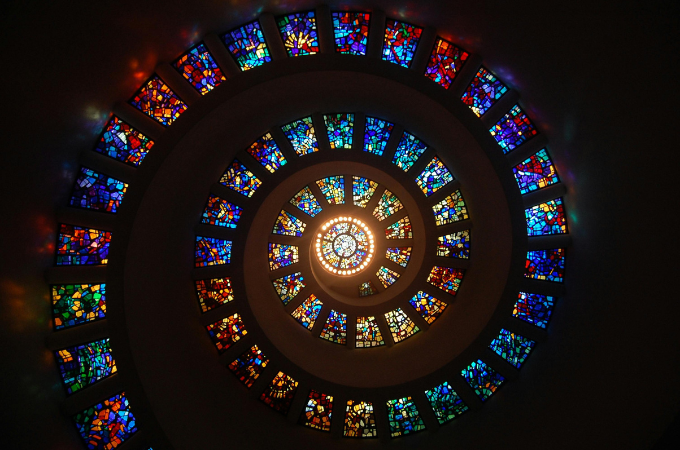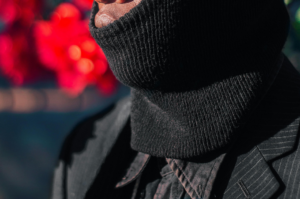
It was raining the last time I prayed. The kind of rain that makes the world feel smaller, folding everything into the steady rhythm of water against rooftops. There was no power, so my room sat in darkness, save for the dim glow of my phone torch. The air smelled of wet earth, thick with something I couldn’t name. I was alone, stretched out on my bed, scrolling aimlessly, when the thought came to me: I should pray.
I don’t know why. It wasn’t guilt or desperation. No fear, no looming crisis. Just a quiet curiosity, like testing an old switch to see if the light would still come on.
So, I closed my eyes. I tried to reach for the words, the familiar rhythm of a prayer — Dear God… But the moment I started, something felt off. Not like before, when prayer was instinctive, woven into the fabric of my days. Now, it felt foreign, like picking up a language I hadn’t spoken in years.
Still, I pressed on. I don’t remember what I said. Maybe I asked for guidance, for clarity. Maybe I asked for nothing at all. What I remember is the silence that followed. Even with the heavy raindrops outside, there was this silence. A silence so deep it felt like it was pressing back, waiting.
Waiting for what? A sign? A feeling? Some confirmation that I was still being heard?
But nothing came. Just the rain, steady and indifferent.
There was a time when prayer was effortless. When faith was not something to question, only something to practice.
I grew up in a house where religion wasn’t just important; it was the foundation of everything. We never took church for granted. Sundays were for worship, for pressed clothes and well-worn Bibles, for sermons that stretched too long but never seemed optional.
At home, my father took his role as our spiritual guide seriously. Every morning, before the day could begin, he would gather us around to examine a passage from the Bible. We took turns reading verses, discussing meanings, absorbing lessons as if they were absolute truths. On weekends, we held family worship, our voices blending in hymns that I once believed reached heaven.
Faith was structure. It was duty. And for the longest time, it was certainty.
I wasn’t just a participant; I was involved. I held positions at church, played my role in the grand machinery of belief. And I believed. Or at least, I never thought not to. Prayer, then, was second nature. It was the first thing I did in the morning, the last thing I did at night. I prayed over meals, over exams, over anything that required divine favor. God was always listening. That was what we were taught.
That was what I believed.
I don’t remember the exact moment I started questioning things. Maybe doubt doesn’t always arrive like a sudden storm — sometimes, it’s just a slow unraveling, a quiet realization that something no longer fits.
But I do remember the first time I heard a sermon about homosexuality. I must have been in my early teens, sitting in church like I always did, half-listening as the pastor spoke. And then, somewhere between the verses and the warnings of sin, I heard it — an abomination, unnatural, displeasing to God.
I sat there, still, as the words settled into me like stones sinking in water.
At that point, I didn’t have a full understanding of myself yet. But I knew enough to recognize what those words meant for someone like me. I knew that the thing they called sin was something I could not change, something that was simply part of me.
And for the first time, church didn’t feel like home.
I kept going, of course. I prayed harder, tried to push the thoughts away. But doubt had already taken root. It started small — little questions I kept tucked away, afraid of what they might grow into.
Why would God make me this way only to condemn me for it?
Why did love, in all its forms, seem so pure everywhere else except within the walls of the church?
And if God was truly all-knowing, all-loving, then why did it feel like He had already made up His mind about me?
The more I listened, the more I felt like an outsider in a place that was supposed to welcome all. And yet, I still held on. Because faith wasn’t just belief; it was history, family, a way of life. To let go of it felt impossible.
So, I didn’t. Not yet.
When the pandemic hit, everything paused. The world shrank to the walls of my home, routines collapsed, and for the first time in my life, going to church was no longer required. Services moved online. My family would still gather in the living room, tuning in to the livestream, singing along to worship songs that felt strange without the weight of a full congregation. The pastor preached to a camera, his voice echoing through an empty church, and somehow, it all felt… distant.
At first, I joined in, sitting with my family out of habit. But as the weeks stretched into months, I started skipping. First, it was just a Sunday or two, excusing myself with a half-hearted I’m tired, or I’ll watch later. But later never came.
And the strangest part? I didn’t miss it. I expected guilt. Some kind of pull to return. But instead, there was nothing. No longing, no emptiness — just quiet.
Maybe it had started long before the pandemic. Maybe this was just the moment I let myself admit it. Because the truth was, I had already started feeling the absence of God long before I stopped showing up to hear about Him.
At first, I thought my silence meant I was waiting. That, in time, I would find my way back. But as days turned to weeks and weeks to months, I started to wonder — what if I wasn’t lost at all?
I wouldn’t say I’m an atheist. That word feels too final, too certain, and certainty is something I don’t have. But I don’t think I’m a believer either — not in the way I used to be.
What I know is that faith doesn’t just disappear overnight. Even when you stop praying, stop going to church, stop believing in the things you once held sacred, some part of it lingers. Not in devotion, but in the way it shaped you.
It’s in the words that slip out of my mouth without thinking — God, help me, even when I don’t know if He’s listening. It’s in the way my fingers almost move to make the sign of the cross when I pass a church, even though I haven’t stepped inside one in years. It’s in the quiet hesitation before I say out loud that I no longer believe — because what if I’m wrong?
Faith, I’ve realized, is more than just belief. It’s culture. It’s memory. It’s the way I was raised, the way my family still carries it like a second skin. And that’s the thing — I’m not the only one who feels the shift. My family notices, even if they don’t say it outright.
I catch it in the way my mother asks, Are you going to join us for prayer? In the way my father still asks, Are you going to church this Sunday? Even though they already know the answer. They never press too hard, never demand explanations. Maybe they’re afraid of what I might say. Maybe they think this is just a phase, that I will find my way back.
I don’t know if I will.
Because the truth is, I don’t know where I stand. I don’t pray, but I don’t mock those who do. I don’t go to church, but I still feel something when I hear gospel music floating through an open window. I don’t know if I believe in God, but sometimes, when I’m alone in the quiet, I wonder if He still believes in me.
Maybe faith is like a language I once spoke fluently but have now forgotten. And maybe — just maybe — I’m not sure whether I want to relearn it or let it fade away completely.










D April 15, 2025 03:28
This is my reality. While I do not doubt the existence of a God, I doubt that God is the one I've been taught and raised to believe in.